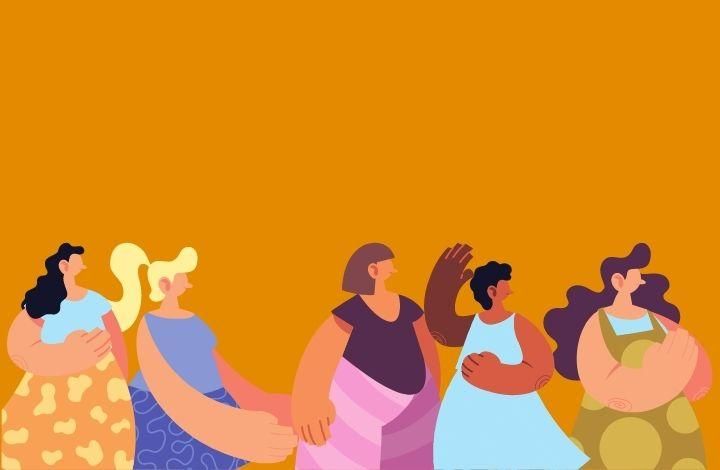This content mentions sexual assault, suicide or suicidal thoughts, self-harm, eating disorders, anxiety, abuse and violence, trauma, body image and substance abuse and addiction (which may include mentions of alcohol or drug use), and some people may find this triggering.
Mental health problems affect both men and women, but not in equal measure.
In England in 2014, one in six adults had a common mental health problem: about one in five women and one in eight men. From 2000 to 2014, rates of common mental health problems in England steadily increased in women and remained largely stable in men.1
In 2018, there were 6,507 suicides registered in the UK2, and in 2019, there were 5,691 suicides registered in England and Wales:
- Of these, three-quarters were among men, which has been the case since the mid-1990s2,3
- Three times as many men as women die by suicide.4
- Men aged 40 to 49 have the highest suicide rates in the UK.5
Men report lower levels of life satisfaction than women, according to the government’s national wellbeing survey.6
Men are less likely to access psychological therapies than women: only 36% of referrals to NHS talking therapies are for men.7
Nearly three-quarters of adults who go missing are men.4
87% of rough sleepers are men.4
Men are nearly three times as likely as women to become dependent on alcohol and three times as likely to report frequent drug use.4
Men are more likely to be compulsorily detained (or ‘sectioned’) for treatment than women.8
Men are more likely to be victims of violent crime (1.5 more likely than women).9
Men make up the vast majority of the prison population. There are high rates of mental health problems and increased rates of self-harm in prisons.4
Women between the ages of 16 and 24 are almost three times as likely (26%) to experience a common mental health issue as males of the same age (9%).10
Women are twice as likely to be diagnosed with anxiety as men.11
25.7% of women and 9.7% of men aged 16 to 24 report having self-harmed at some point in their life.12
Statistics about women and girls' mental health
According to our 2017 report on the mental health of women and girls:
- Today, women are three times more likely than men to experience common mental health problems. In 1993, they were twice as likely
- Rates of self-harm among young women have tripled since 1993
- Women are more than three times as likely to experience eating disorders than men
- Young women are three times more likely than young men to experience post-traumatic stress disorder
- Young women are more likely to experience anxiety-related conditions than any other group
Browse all of the mental health statistics
If you feel like ending your life or are unable to keep yourself safe, please call 999 or go to A&E and ask for the contact of the nearest crisis resolution team. These are teams of mental health care professionals who work with people in severe distress. If you feel affected by the content you have read, please see our get help page for support.
Our 2016 study 'The Fundamental Facts about Mental Health' follows a comprehensive summary of mental health research, providing a unique handbook of key facts and figures covering all key areas of mental health.
Find out moreMen and Women: A-Z Topics
Find out more about what affects our mental health with our A-Z Topics.
Find out more
References
- McManus S, Bebbington P, Jenkins R, Brugha T. (eds.) (2016) Mental health and wellbeing in England: Adult Psychiatric Morbidity Survey 2014. Leeds: NHS Digital. Available at: http://content.digital.nhs.uk/catalogue/PUB21748/apms-2014-full-rpt.pdf
- ONS. (2019). Suicides in the UK: 2018 registrations. Retrieved from: https://www.ons.gov.uk/peoplepopulationandcommunity/birthsdeathsandmarriages/deaths/bulletins/suicidesintheunitedkingdom/2018registrations
- ONS. (2020). Suicides in England and Wales: 2019 registrations. Retrieved from: https://www.ons.gov.uk/peoplepopulationandcommunity/birthsdeathsandmarriages/deaths/bulletins/suicidesintheunitedkingdom/2019registrations
- https://www.menshealthforum.org.uk/key-data-mental-health
- https://mhfaengland.org/mhfa-centre/research-and-evaluation/mental-health-statistics/
- https://www.ons.gov.uk/peoplepopulationandcommunity/wellbeing/bulletins/measuringnationalwellbeing/october2016toseptember2017
- https://files.digital.nhs.uk/99/3916C8/ment-heal-act-stat-eng-2019-20-summ-rep%20v1.1.pdf
- https://www.ons.gov.uk/peoplepopulationandcommunity/crimeandjustice/compendium/focusonviolentcrimeandsexualoffences/yearendingmarch2015/chapter1overviewofviolentcrimeandsexualoffences#characteristics-associated-with-being-a-victim
- https://www.menshealthforum.org.uk/key-data-mental-health
- McManus S, Bebbington P, Jenkins R, Brugha T. Mental health and wellbeing in England: Adult Psychiatric Morbidity Survey 2014 [Internet]. Leeds; 2016. Available from: content.digital.nhs.uk
- Remes O, Brayne C, van der Linde R, Lafortune L. A systematic review of reviews on the prevalence of anxiety disorders in adult populations [Internet]. Vol. 6, Brain and Behavior. 2016 [cited 2016 Dec 2]. p. e00497. Available from: doi.wiley.com